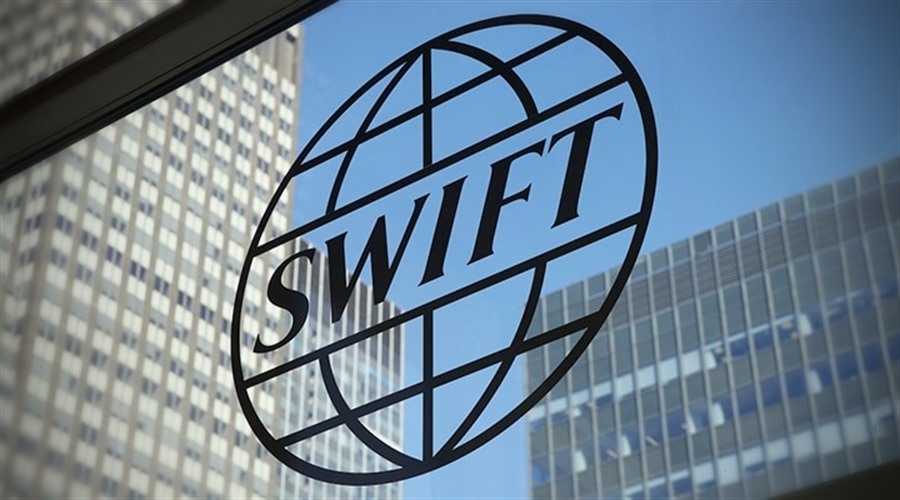Swift Standardises Payments Chain; Offers White-Label Tracking Service

by Arnab Shome
- The white-label tracking service can be accessed via API or messaging channels.
- The service is expected to increase transparency of payment status and provide confirmation of receipts.
Swift, a cooperative that operates a widely used financial messaging service, today (Tuesday) announced that it is providing member banks with white-labelled tracking services for cross-border payments. The Belgium-headquartered body has also standardised its entire payment chain with the ISO 20022 standard.
Standardisation of Services
According to the official announcement, banks can now offer customers ready-made and white-labelled payment tracking services accessed via API or messaging channels. Swift highlighted that the tracking service will increase transparency of payment status and provide confirmation of receipts.
The white-label service will standardise the current corporate payment tracking systems, which come in different channels and formats, allowing financial institutions to offer the same experience to their corporate customer base.
“Having direct API access to Swift’s payment tracking system will provide us with more transparency and strengthen our ability to analyse overall payment performance,” said Stefan Windisch, Global Head of In-House Bank at Roche, which has already implemented Swift’s corporate API. “It will allow us to refine our instructions, better identify inefficiencies, and minimise erosion of value in cross-border payments.”
The Backbone of Cross-Border Payments
Established in 1973, Swift is known for operating the inter-bank financial messaging network, which has become the backbone of cross-border payments. However, modern technologies like blockchain are now challenging the legacy payment network.
Earlier, Swift also pointed out that its infrastructure can “seamlessly” facilitate the transfer of tokenised assets across multiple public and private blockchains.
Swift pointed out the advantage of standardisation: its new system will standardise corporate payments complicated by competing standards and proprietary formats. The organisation also developed its new standardised services with 25 leading cash management banks and 20 sector-leading corporates.
“Adoption of ISO 20022 provides a unique opportunity to improve cross-border payments,” Swift’s Chief Strategy Officer, Thierry Chilosi, said.
“Capturing rich data at source will enhance the entire ecosystem, driving us closer to our goals of instant and frictionless transactions. We’re delighted to be making it easy for our community to extend the benefits to their customers while simplifying and standardising access to services, such as tracking, which are so important to efficient corporate treasury.”
Swift, a cooperative that operates a widely used financial messaging service, today (Tuesday) announced that it is providing member banks with white-labelled tracking services for cross-border payments. The Belgium-headquartered body has also standardised its entire payment chain with the ISO 20022 standard.
Standardisation of Services
According to the official announcement, banks can now offer customers ready-made and white-labelled payment tracking services accessed via API or messaging channels. Swift highlighted that the tracking service will increase transparency of payment status and provide confirmation of receipts.
The white-label service will standardise the current corporate payment tracking systems, which come in different channels and formats, allowing financial institutions to offer the same experience to their corporate customer base.
“Having direct API access to Swift’s payment tracking system will provide us with more transparency and strengthen our ability to analyse overall payment performance,” said Stefan Windisch, Global Head of In-House Bank at Roche, which has already implemented Swift’s corporate API. “It will allow us to refine our instructions, better identify inefficiencies, and minimise erosion of value in cross-border payments.”
The Backbone of Cross-Border Payments
Established in 1973, Swift is known for operating the inter-bank financial messaging network, which has become the backbone of cross-border payments. However, modern technologies like blockchain are now challenging the legacy payment network.
Earlier, Swift also pointed out that its infrastructure can “seamlessly” facilitate the transfer of tokenised assets across multiple public and private blockchains.
Swift pointed out the advantage of standardisation: its new system will standardise corporate payments complicated by competing standards and proprietary formats. The organisation also developed its new standardised services with 25 leading cash management banks and 20 sector-leading corporates.
“Adoption of ISO 20022 provides a unique opportunity to improve cross-border payments,” Swift’s Chief Strategy Officer, Thierry Chilosi, said.
“Capturing rich data at source will enhance the entire ecosystem, driving us closer to our goals of instant and frictionless transactions. We’re delighted to be making it easy for our community to extend the benefits to their customers while simplifying and standardising access to services, such as tracking, which are so important to efficient corporate treasury.”
Arnab is an electronics engineer-turned-financial editor. He entered the industry covering the cryptocurrency market for Finance Magnates and later expanded his reach to forex as well. He is passionate about the changing regulatory landscape on financial markets and keenly follows the disruptions in the industry with new-age technologies.
- 6300 Articles
- 80 Followers
Keep Reading
More from the Author
-
Leverate Joins the Dubai Dash: Opens a New Office
Leverate Joins the Dubai Dash: Opens a New Office
Leverate Joins the Dubai Dash: Opens a New Office
Leverate Joins the Dubai Dash: Opens a New Office
Leverate Joins the Dubai Dash: Opens a New Office
Leverate Joins the Dubai Dash: Opens a New Office
Leverate Joins the Dubai Dash: Opens a New Office
Leverate Joins the Dubai Dash: Opens a New Office
Leverate Joins the Dubai Dash: Opens a New Office
Leverate Joins the Dubai Dash: Opens a New Office
-
Ether ETF Approval Imminent? SEC Asks 3 Exchanges to Amend Filings: Report
Ether ETF Approval Imminent? SEC Asks 3 Exchanges to Amend Filings: Report
Ether ETF Approval Imminent? SEC Asks 3 Exchanges to Amend Filings: Report
Ether ETF Approval Imminent? SEC Asks 3 Exchanges to Amend Filings: Report
Ether ETF Approval Imminent? SEC Asks 3 Exchanges to Amend Filings: Report
Ether ETF Approval Imminent? SEC Asks 3 Exchanges to Amend Filings: Report
Ether ETF Approval Imminent? SEC Asks 3 Exchanges to Amend Filings: Report
Ether ETF Approval Imminent? SEC Asks 3 Exchanges to Amend Filings: Report
Ether ETF Approval Imminent? SEC Asks 3 Exchanges to Amend Filings: Report
Ether ETF Approval Imminent? SEC Asks 3 Exchanges to Amend Filings: Report
-
FD Technologies’ FY24 Revenue Stays Flat despite KX’s Push
FD Technologies’ FY24 Revenue Stays Flat despite KX’s Push
FD Technologies’ FY24 Revenue Stays Flat despite KX’s Push
FD Technologies’ FY24 Revenue Stays Flat despite KX’s Push
FD Technologies’ FY24 Revenue Stays Flat despite KX’s Push
FD Technologies’ FY24 Revenue Stays Flat despite KX’s Push
FD Technologies’ FY24 Revenue Stays Flat despite KX’s Push
FD Technologies’ FY24 Revenue Stays Flat despite KX’s Push
FD Technologies’ FY24 Revenue Stays Flat despite KX’s Push
FD Technologies’ FY24 Revenue Stays Flat despite KX’s Push
-
MultiBank Group Launches Its Dubai-Based Institutional ECN
MultiBank Group Launches Its Dubai-Based Institutional ECN
MultiBank Group Launches Its Dubai-Based Institutional ECN
MultiBank Group Launches Its Dubai-Based Institutional ECN
MultiBank Group Launches Its Dubai-Based Institutional ECN
MultiBank Group Launches Its Dubai-Based Institutional ECN
MultiBank Group Launches Its Dubai-Based Institutional ECN
MultiBank Group Launches Its Dubai-Based Institutional ECN
MultiBank Group Launches Its Dubai-Based Institutional ECN
MultiBank Group Launches Its Dubai-Based Institutional ECN
-
Leverage or No Leverage? Scope Markets Sweetens CFDs Trading
Leverage or No Leverage? Scope Markets Sweetens CFDs Trading
Leverage or No Leverage? Scope Markets Sweetens CFDs Trading
Leverage or No Leverage? Scope Markets Sweetens CFDs Trading
Leverage or No Leverage? Scope Markets Sweetens CFDs Trading
Leverage or No Leverage? Scope Markets Sweetens CFDs Trading
Leverage or No Leverage? Scope Markets Sweetens CFDs Trading
Leverage or No Leverage? Scope Markets Sweetens CFDs Trading
Leverage or No Leverage? Scope Markets Sweetens CFDs Trading
Leverage or No Leverage? Scope Markets Sweetens CFDs Trading
-
Genesis’ Parent Will Not See Any Recovery amid $3 Billion Payout Approval
Genesis’ Parent Will Not See Any Recovery amid $3 Billion Payout Approval
Genesis’ Parent Will Not See Any Recovery amid $3 Billion Payout Approval
Genesis’ Parent Will Not See Any Recovery amid $3 Billion Payout Approval
Genesis’ Parent Will Not See Any Recovery amid $3 Billion Payout Approval
Genesis’ Parent Will Not See Any Recovery amid $3 Billion Payout Approval
Genesis’ Parent Will Not See Any Recovery amid $3 Billion Payout Approval
Genesis’ Parent Will Not See Any Recovery amid $3 Billion Payout Approval
Genesis’ Parent Will Not See Any Recovery amid $3 Billion Payout Approval
Genesis’ Parent Will Not See Any Recovery amid $3 Billion Payout Approval
FinTech
-
Buy Now, Pay Later and the Fight for Consumer Protection
Buy Now, Pay Later and the Fight for Consumer Protection
Buy Now, Pay Later and the Fight for Consumer Protection
Buy Now, Pay Later and the Fight for Consumer Protection
Buy Now, Pay Later and the Fight for Consumer Protection
Buy Now, Pay Later and the Fight for Consumer Protection
Buy Now, Pay Later and the Fight for Consumer Protection
Buy Now, Pay Later and the Fight for Consumer Protection
Buy Now, Pay Later and the Fight for Consumer Protection
Buy Now, Pay Later and the Fight for Consumer Protection
-
Behind the Mastercard and Visa Crackdown: How the PSR Scrutinizes Card Scheme Fees
Behind the Mastercard and Visa Crackdown: How the PSR Scrutinizes Card Scheme Fees
Behind the Mastercard and Visa Crackdown: How the PSR Scrutinizes Card Scheme Fees
Behind the Mastercard and Visa Crackdown: How the PSR Scrutinizes Card Scheme Fees
Behind the Mastercard and Visa Crackdown: How the PSR Scrutinizes Card Scheme Fees
Behind the Mastercard and Visa Crackdown: How the PSR Scrutinizes Card Scheme Fees
Behind the Mastercard and Visa Crackdown: How the PSR Scrutinizes Card Scheme Fees
Behind the Mastercard and Visa Crackdown: How the PSR Scrutinizes Card Scheme Fees
Behind the Mastercard and Visa Crackdown: How the PSR Scrutinizes Card Scheme Fees
Behind the Mastercard and Visa Crackdown: How the PSR Scrutinizes Card Scheme Fees
-
UK Payment Regulator Faults Visa and Mastercard for Fee Hikes
UK Payment Regulator Faults Visa and Mastercard for Fee Hikes
UK Payment Regulator Faults Visa and Mastercard for Fee Hikes
UK Payment Regulator Faults Visa and Mastercard for Fee Hikes
UK Payment Regulator Faults Visa and Mastercard for Fee Hikes
UK Payment Regulator Faults Visa and Mastercard for Fee Hikes
UK Payment Regulator Faults Visa and Mastercard for Fee Hikes
UK Payment Regulator Faults Visa and Mastercard for Fee Hikes
UK Payment Regulator Faults Visa and Mastercard for Fee Hikes
UK Payment Regulator Faults Visa and Mastercard for Fee Hikes
-
Stripe Unveils New Platform to Boost Small Businesses in the UK
Stripe Unveils New Platform to Boost Small Businesses in the UK
Stripe Unveils New Platform to Boost Small Businesses in the UK
Stripe Unveils New Platform to Boost Small Businesses in the UK
Stripe Unveils New Platform to Boost Small Businesses in the UK
Stripe Unveils New Platform to Boost Small Businesses in the UK
Stripe Unveils New Platform to Boost Small Businesses in the UK
Stripe Unveils New Platform to Boost Small Businesses in the UK
Stripe Unveils New Platform to Boost Small Businesses in the UK
Stripe Unveils New Platform to Boost Small Businesses in the UK
-
The Esperanto of Money?
The Esperanto of Money?
The Esperanto of Money?
The Esperanto of Money?
The Esperanto of Money?
The Esperanto of Money?
The Esperanto of Money?
The Esperanto of Money?
The Esperanto of Money?
The Esperanto of Money?
-
Face Off: Convenience or Big Brother in Your Burger Joint?
Face Off: Convenience or Big Brother in Your Burger Joint?
Face Off: Convenience or Big Brother in Your Burger Joint?
Face Off: Convenience or Big Brother in Your Burger Joint?
Face Off: Convenience or Big Brother in Your Burger Joint?
Face Off: Convenience or Big Brother in Your Burger Joint?
Face Off: Convenience or Big Brother in Your Burger Joint?
Face Off: Convenience or Big Brother in Your Burger Joint?
Face Off: Convenience or Big Brother in Your Burger Joint?
Face Off: Convenience or Big Brother in Your Burger Joint?
-
Buy Now, Pay Later and the Fight for Consumer Protection
Buy Now, Pay Later and the Fight for Consumer Protection
-
Behind the Mastercard and Visa Crackdown: How the PSR Scrutinizes Card Scheme Fees
Behind the Mastercard and Visa Crackdown: How the PSR Scrutinizes Card Scheme Fees
-
UK Payment Regulator Faults Visa and Mastercard for Fee Hikes
UK Payment Regulator Faults Visa and Mastercard for Fee Hikes
-
Stripe Unveils New Platform to Boost Small Businesses in the UK
Stripe Unveils New Platform to Boost Small Businesses in the UK
Featured Videos
SuperApps: One App to Rule Them All?
SuperApps: One App to Rule Them All?
SuperApps: One App to Rule Them All?
SuperApps: One App to Rule Them All?
“SuperApps: One App to Rule Them All?” Catch what the experts think about the future of financial services.
“SuperApps: One App to Rule Them All?” Catch what the experts think about the future of financial services.
“SuperApps: One App to Rule Them All?” Catch what the experts think about the future of financial services.
“SuperApps: One App to Rule Them All?” Catch what the experts think about the future of financial services.
-
Lebowa Capital’s Jimmy Moyaha at an FMLS:24 panel discussion
Lebowa Capital’s Jimmy Moyaha at an FMLS:24 panel discussion
Lebowa Capital’s Jimmy Moyaha at an FMLS:24 panel discussion
Lebowa Capital’s Jimmy Moyaha at an FMLS:24 panel discussion
Lebowa Capital’s Jimmy Moyaha at an FMLS:24 panel discussion
Lebowa Capital’s Jimmy Moyaha at an FMLS:24 panel discussion
Lebowa Capital’s Jimmy Moyaha at an FMLS:24 panel discussion explaining the impact of news on trading.
Lebowa Capital’s Jimmy Moyaha at an FMLS:24 panel discussion explaining the impact of news on trading.
Lebowa Capital’s Jimmy Moyaha at an FMLS:24 panel discussion explaining the impact of news on trading.
Lebowa Capital’s Jimmy Moyaha at an FMLS:24 panel discussion explaining the impact of news on trading.
Lebowa Capital’s Jimmy Moyaha at an FMLS:24 panel discussion explaining the impact of news on trading.
Lebowa Capital’s Jimmy Moyaha at an FMLS:24 panel discussion explaining the impact of news on trading.
-
Doo Prime’s Fraser Nelson is explaining the challenges of liquidity in different markets.
Doo Prime’s Fraser Nelson is explaining the challenges of liquidity in different markets.
Doo Prime’s Fraser Nelson is explaining the challenges of liquidity in different markets.
Doo Prime’s Fraser Nelson is explaining the challenges of liquidity in different markets.
Doo Prime’s Fraser Nelson is explaining the challenges of liquidity in different markets.
Doo Prime’s Fraser Nelson is explaining the challenges of liquidity in different markets.
Doo Prime’s Fraser Nelson is explaining the challenges of liquidity in different markets while participating in a panel discussion on “How to Trade the News.”
Doo Prime’s Fraser Nelson is explaining the challenges of liquidity in different markets while participating in a panel discussion on “How to Trade the News.”
Doo Prime’s Fraser Nelson is explaining the challenges of liquidity in different markets while participating in a panel discussion on “How to Trade the News.”
Doo Prime’s Fraser Nelson is explaining the challenges of liquidity in different markets while participating in a panel discussion on “How to Trade the News.”
Doo Prime’s Fraser Nelson is explaining the challenges of liquidity in different markets while participating in a panel discussion on “How to Trade the News.”
Doo Prime’s Fraser Nelson is explaining the challenges of liquidity in different markets while participating in a panel discussion on “How to Trade the News.”
-
FMLS:24 exhibition venue is crowded on the second day.
FMLS:24 exhibition venue is crowded on the second day.
FMLS:24 exhibition venue is crowded on the second day.
FMLS:24 exhibition venue is crowded on the second day.
FMLS:24 exhibition venue is crowded on the second day.
FMLS:24 exhibition venue is crowded on the second day.
-
Panel Discussion on “Regulation, Trust, and the Future of Trading in Africa”
Panel Discussion on “Regulation, Trust, and the Future of Trading in Africa”
Panel Discussion on “Regulation, Trust, and the Future of Trading in Africa”
Panel Discussion on “Regulation, Trust, and the Future of Trading in Africa”
Panel Discussion on “Regulation, Trust, and the Future of Trading in Africa”
Panel Discussion on “Regulation, Trust, and the Future of Trading in Africa”
Experts discuss the topic “Regulation, Trust, and the Future of Trading in Africa” at FMLS:24
Experts discuss the topic “Regulation, Trust, and the Future of Trading in Africa” at FMLS:24
Experts discuss the topic “Regulation, Trust, and the Future of Trading in Africa” at FMLS:24
Experts discuss the topic “Regulation, Trust, and the Future of Trading in Africa” at FMLS:24
Experts discuss the topic “Regulation, Trust, and the Future of Trading in Africa” at FMLS:24
Experts discuss the topic “Regulation, Trust, and the Future of Trading in Africa” at FMLS:24





















